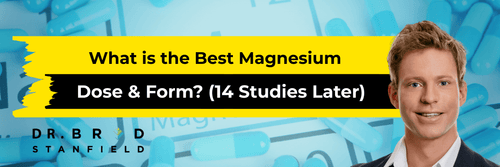One of the only constants in life is aging. The passage of time affects us all, though not always equally; differences in genetics, in exposure to things light ultraviolet radiation and environmental contamination, in our overall health and access to medical care, can all influence how we age.
A significant subset of the overall population faces aging with a degree of resistance. It's understandably difficult to see the effects of the passage of time written on our bodies. The beauty industry, built on assuaging this fear, offers thousands of products to help counteract the effects of aging.
The trouble is, there's no end to the grifters and profiteers who will happily sell snake oil with bold claims to people desperate to turn back time. The beauty industry is rife with people who make claims on just about everything, many of which are unsubstantiated or blown out of proportion.
Without experience or a medical degree, it's very difficult to tell what is and isn't real when evaluating a supplement. Fortunately, I have both, and I've made it my mission to help bring an evaluation of science to the health and beauty industries, to separate the facts from the insubstantial promises.
If you're concerned about the signs of aging visible on your skin – wrinkles, a loss of elasticity, skin spots, and the like – read on to learn more about what does and doesn't work.
Table of Contents
Beyond Vanity: Why Skin Appearance is Important
In the intro, I framed this issue as a matter of beauty and appearance – in short, vanity. But there's more to it than self-esteem. The way our skin looks is a reflection of our health, but more than that, it's a feedback mechanism. People who look in the mirror and see themselves as older are more likely to write off many of the mechanisms they can use to maintain their health. They think, "Well, I don't have much longer left, so why bother with that?" Whether it's healthy eating, exercise, avoiding sun damage, smoking, or whatever other sources of damage to our health, that visual feedback is critical.
Therefore, in a very real sense, taking actions to maintain a youthful appearance can feed back into supporting healthy habits, which can, in turn, promote your overall health and keep you looking – and feeling – younger and healthier.

So, what can you do to help promote better skin health, to augment that feedback mechanism and encourage healthier habits? I've reviewed the science and put together a full routine.
Step 1: Take Hyaluronic Acid
Hyaluronic acid is an extremely prevalent compound found throughout our bodies. It's effectively the structure upon which our cells are built, and it holds everything together. It's a key part of nearly every part of our bodies, but it's by far the most prevalent in our skin. Unfortunately, the body's concentrations of hyaluronic acid decline as we age; one study showed that a 75-year-old individual had only a quarter as much in their skin as a 19-year-old.
There are two important points to discuss with hyaluronic acid. The first is, as with all supplements, a question of whether or not actually taking that supplement is effective. The body works in many roundabout ways, and you can't always simply take a product made from the end result you want and assume it will work. Often, you need to consume the building blocks instead. Hyaluronic acid, in particular, has seen a lot of back-and-forth over the years, and a recent 2023 paper threw a new wrench into the works.
Early animal studies showed that hyaluronic supplements were effective. Hyaluronic acid is a chain molecule, which means it can come in different lengths. The longer lengths are beneficial to the skin and can be absorbed and transported to the skin for repair. Shorter chain versions are also absorbed, but they can cause inflammation and damage instead. However, none of this is really reflected in how the body actually processes hyaluronic acid.

What actually happens when you take hyaluronic acid is your body breaks it down into its component parts, oligosaccharides, as well as small bits of fatty acids. These are then transported and used in the skin. Fortunately, recent randomly controlled trials have found that hyaluronic acid supplements show a significant improvement compared to placebo supplements. This is why I've chosen to include a small dose of hyaluronic acid in MicroVitamin.
The second discussion point is safety. Specifically, studies involving single-cell cancer trials showed that hyaluronic acid accelerated the growth of those cancers. However, these aren't reflective tests; they isolate cancers from all other bodily processes. Tests with cancers in mice showed that hyaluronic acid had no impact on the growth rates of those cancers, and there is, as of yet, no evidence that they do so in humans either.
So, overall, hyaluronic acid can reduce skin wrinkles by as much as 18%, with the only noteworthy side effect being some stomach upset in some people. There's also no reason to take the more expensive long-chain hyaluronic acid, as it's all broken down by the body anyway.
Step 2: Take Collagen Peptides
The third part of a dedicated skincare routine that can potentially help reduce wrinkles and improve skin elasticity is another of the core molecules that makes up skin: collagen.
If hyaluronic acid is the scaffold that helps build skin cells, collagen is the frame that is used to build them. Collagen is a core component of skin, bones, and organs, and it's a key molecule that provides structure and elasticity.
Collagen is similar to hyaluronic acid in that it is a long-chain molecule. When you take collagen – or eat it in your diet – it is broken down into amino acids and then used to rebuild collagen as necessary in your skin. Collagen peptides are a pre-broken short-chain version of collagen that streamlines this process.

Critics of collagen say that, since it's broken down already, there's no benefit to taking collagen supplements over just eating more protein, which contains much of the same set of amino acids. However, studies have shown that taking collagen peptides helps to bypass some of the bodily processes that handle protein, to use the collagen directly without needing to fully process it first. A study comparing burn patients given protein and peptides found that peptides accelerated wound healing, and a 2023 analysis of 23 trials found peptides had significant benefits on skin health.
Like hyaluronic acid, I take collagen peptide supplements daily. Unlike HA, however, I don't include collagen in MicroVitamin and choose to take it separately instead. This is mostly a practical concern due to the amount of collagen and the form I take, as well as the number of other things already in MicroVitamin.
As always, just because I choose to take a supplement doesn't mean you should take it as well. Different people react differently to supplements, and different existing conditions, as well as genetic factors, can play a role. Always talk to your own health professionals to identify the path that's right for you.
Step 3: Use Sunscreen
Quite possibly one of the most important things you can do to preserve your skin health is to wear sunscreen. Ultraviolet radiation from the sun is well-known to cause skin damage, both in the short-term sense as sunburn and in the long-term sense in breaking down collagen, damaging the skin's natural elasticity, and even causing skin cancer.
Recent studies have also shown that regular sunscreen use can dramatically slow or even halt the effects of aging on skin, and can even restore and repair the skin to reverse the effects of aging, at least to a limited degree. The two most important factors are using sunscreen on all exposed skin (such as including the neck, not just the face), and using a sunscreen with the right ingredients.
Broadly speaking, sunscreens come in two forms: mineral sunscreens and chemical sunscreens. Mineral sunscreens sit on the skin and provide a layer of protection, while chemical sunscreens penetrate the skin. This allows them to be more water-resistant and provide better protection, but some of the ingredients found in chemical sunscreens can be damaging to your health. There are at least twelve ingredients found in sunscreens that the FDA wants more information about before they will recognize them as safe.
In contrast, two ingredients the FDA does recognize as safe are Titanium Dioxide and Zinc Oxide. Titanium Dioxide is effective at preventing UV-A radiation, but Zinc Oxide is better, and blocks both UV-A and UV-B. To me, that means any sunscreen you use should avoid the FDA's unknown chemicals list, and include Zinc Oxide.

What are the chemicals to avoid? Keep an eye out for Ensulizole, Octisalate, Homosalate, Octocrylene, Octinoxate, Oxybenzone, Avobenzone, Cinoxate, Dioxybenzone, Meradimate, Padimate O, and Sulisobenzone. Be aware, too, that these can show up in mineral sunscreens, not just chemical sunscreens, despite the labels.
Don't forget that you should be applying more sunscreen than you think, and reapplying every two hours, or more often if you're swimming or sweating, which can wash it away.
I also recommend, if you can find it, using a sunscreen with bemotrizinol. This is a large-molecule chemical that is effective at blocking both kinds of UV radiation, while providing a better level of protection than minerals alone, and no risk of absorption through the skin. While you would think this chemical would be broadly available, the FDA has not yet finalized its approval, despite widespread testing overseas. The science shows it is safe and effective, but the FDA hasn't caught up yet.
Does sunscreen help tighten skin? Not necessarily. One study found that using sunscreen was correlated with tighter, more elastic skin, but it's likely not so much the sunscreen itself. Rather, it's your body's ability to heal finally being able to outweigh the damage done by sun exposure.
Keeping Skin Healthy
After having reviewed dozens of papers, trials, and studies, I've learned that while there are a large number of ways to help keep skin healthy, only collagen peptides and hyaluronic acid can really do so as supplements. Other options are like sunscreen: they're preventative. Exercise, good sleep, and a healthy diet are all also effective, but it's hard to call exercise a supplement, right? Similarly, a popular kind of skin cream ingredient – retinoids – are a protective ingredient rather than a supplement.

I have several videos on my YouTube channel that dig into these and other skincare options to help you maintain healthy skin. Here's one such video you can watch for a deeper dive into what I've listed here today, as well as a few additional options.
Sources:
- Facial Appearance Reflects Human Familial Longevity and Cardiovascular Disease Risk in Healthy Individuals: https://academic.oup.com/biomedgerontology/article-abstract/68/2/145/544529
- Sunscreen and prevention of skin aging: a randomized trial: https://pubmed.ncbi.nlm.nih.gov/23732711/
- Daily Use of a Facial Broad Spectrum Sunscreen Over One Year Significantly Improves Clinical Evaluation of Photoaging: https://pubmed.ncbi.nlm.nih.gov/27749441/
- Effect of Sunscreen Application on Plasma Concentration of Sunscreen Active Ingredients – A Randomized Clinical Trial: https://jamanetwork.com/journals/jama/fullarticle/2759002
- American Academy of Dermatology Association Sunscreen FAQs: https://www.aad.org/media/stats-sunscreen
- The Banned Sunscreen Ingredients and Their Impact on Human Health: A Systematic Review: https://pmc.ncbi.nlm.nih.gov/articles/PMC7648445/
- Ageing research: rethinking primary prevention of skin cancer: https://onlinelibrary.wiley.com/doi/full/10.1111/jdv.17660
- DermaNet – Collagen: https://dermnetnz.org/topics/collagen
- Oral hyaluronan relieves wrinkles: a double-blinded, placebo-controlled study over a 12-week period: https://pmc.ncbi.nlm.nih.gov/articles/PMC5522662/
- Hyaluronic Acid: A Powerful Biomolecule with Wide-Ranging Applications—A Comprehensive Review: https://pmc.ncbi.nlm.nih.gov/articles/PMC10299688/
- Oral Administration of Polymer Hyaluronic Acid Alleviates Symptoms of Knee Osteoarthritis: A Double-Blind, Placebo-Controlled Study over a 12-Month Period: https://pmc.ncbi.nlm.nih.gov/articles/PMC3512263/
- Novel conformation of hyaluronic acid with improved cosmetic efficacy: https://pubmed.ncbi.nlm.nih.gov/36575898/
- Molecular weight and gut microbiota determine the bioavailability of orally administered hyaluronic acid: https://pubmed.ncbi.nlm.nih.gov/37182970/
- Oral Hyaluronan Relieves Wrinkles and Improves Dry Skin: A 12-Week Double-Blinded, Placebo-Controlled Study: https://pmc.ncbi.nlm.nih.gov/articles/PMC8308347/
- Oral intake of a new full-spectrum hyaluronan improves skin profilometry and ageing: a randomized, double-blind, placebo-controlled clinical trial: https://pubmed.ncbi.nlm.nih.gov/34933842/
- Oral administration of hyaluronic acid to improve skin conditions via a randomized, double‐blind clinical test: https://pmc.ncbi.nlm.nih.gov/articles/PMC10661223/
- Hyaluronic acid fuels pancreatic cancer cell growth: https://pmc.ncbi.nlm.nih.gov/articles/PMC8730721/
- No influence of exogenous hyaluronan on the behavior of human cancer cells or endothelial cell capillary formation: https://pubmed.ncbi.nlm.nih.gov/24894153/
- Oral Supplementation of Low-Molecular-Weight Collagen Peptides Reduces Skin Wrinkles and Improves Biophysical Properties of Skin: A Randomized, Double-Blinded, Placebo-Controlled Study: https://pubmed.ncbi.nlm.nih.gov/36516059/
- Dose-dependent changes in the levels of free and peptide forms of hydroxyproline in human plasma after collagen hydrolysate ingestion: https://www.sciencedirect.com/science/article/abs/pii/S0308814614002763
- The effect of a hydrolyzed collagen-based supplement on wound healing in patients with burn: A randomized, double-blind pilot clinical trial: https://pubmed.ncbi.nlm.nih.gov/31859087/
- Effects of Oral Collagen for Skin Anti-Aging: A Systematic Review and Meta-Analysis: https://pmc.ncbi.nlm.nih.gov/articles/PMC10180699/


























